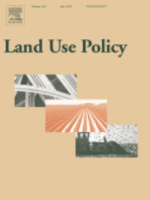Land tenure formalisation and perceived tenure security: Two decades of the land administration project in Ghana
After years of land reform programs across Africa, challenges remain in finding optimal tenurial arrangements that achieve the desirable goals of productivity growth, poverty reduction, sustainable land use, and more urgent climate action. With climate change and population growth, resource management institutions will be tested to their limits. Ghana’s Land Administration Project (LAP), initiated in 2003, aimed to enhance certainty regarding land rights. What has been achieved since then? We explore landowners’ perceptions of tenure security in Ghana using micro-level data from two waves of the Ghanaian Living Standards Surveys: GLSS5+ (2008), GLSS7 (2017) and a compendium of government reports and LAP assessment reports.
We show that at the national level, both formal titles and customary ownership yield a perception of security. Yet, despite the regional variation, formal titles exhibit higher perceptions of security compared to customary systems. Traditional institutions that held the commons system together have long been compromised with commodification. The required resources for the green transition will likely test land management institutions to their limit. The Ghanaian evidence suggests that those who regard themselves as secure within the customary system may perceive themselves even more secure with formal titles as a tenure security-boosting strategy. We contribute important insights for research and policy, respectively.
Regarding research, we show that insights from national-level microdata analysis provide a vantage point that allows researchers to get a broader national perspective and complement case studies. These results demonstrate broad shifts in tenure security perceptions, complementing local cases that produce important contextual insights but sometimes produce discrepant outcomes due to different study designs. Throughout the study, we use nuances from contextual studies that demonstrate complexity. However, our use of quantifiable measures allows us to suggest further research that, for instance, will explore why tenure security remains precarious in some regions and not in others and further research exploring shared responsibility in land administration between the state and customary systems to reconcile local chieftaincy prerogatives and national strategies.
Regarding policy, we do not argue for levelling the tenure system into one uniform and formal outcome. Rather, we argue that formal titles produce higher perceptions of security where the customary system has been weakened. This implies that overcoming formalisation challenges in such regions remains an important goal. Getting things right is beyond technocratic procedures, often with external funders’ agendas. We argue that inclusive land administration requires trust-building among all stakeholders. In this case, even mundane processes involving stakeholders in dialogue are important steps, although the external funders may not rank these in their performance criteria. What is applicable beyond Ghana is the complexities that legal pluralism brings to land tenure reforms and land administration systems. Across Africa, chieftaincy predates the modern state and has been historically connected to land custody. Land stewards such as chiefs and clan heads embody contextual expertise on land. They are instrumental in untangling norms and values (in)compatible with statutory rules and identifying possible ways of resolving them or creating co-existence. This process must also go beyond the chiefs and the rural elite to incorporate ordinary landowners.
DIIS Experts


